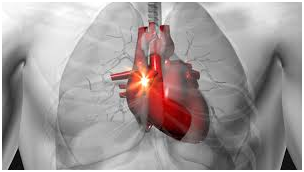Have you ever experienced having heart palpitations after eating? It can be uncomfortable, especially if what you want to do after meals is relax and de-stress from a taxing day at work. Now the question is why do you experience it? Is it the type of medical emergency warranting a trip to the hospital in the middle of the night?

Well, the good news is now there are virtual doctor visits that you could try right from the comfort of your own home. That means you can use the Internet to consult with a doctor, and it's a legitimate procedure. Now let's find out more about heart palpitations, particularly why you experience it.
If the meal is heavy or contains stimulants like caffeine or sugar, a raised heartbeat can occur after eating. Heart palpitations after eating are often common to overweight people made apparent by racing or fluttering heartbeats after a meal, this may be felt as well even during eating.
After eating, the heart needs to pump more blood to your stomach and other adjoining areas to aid in the process of digestion and assimilation of food. However, for some people, this routine activity of the heart may manifest as palpitations.
Causes of heart palpitations after eating could range from psychological palpitations to hormonal fluctuation irregularities, like the sudden consumption of food from staying hungry for long that are often seen on people with anorexia nervosa. Sudden bingeing causes rapid increase in blood sugar level that leads to cardiac arrhythmia followed by a chain of reaction such as lowering of blood sugar and secretion of adrenaline that causes heart palpitations after eating. It would be wise for you to talk to a doctor, even by online chatting, to ask whether it's a cause for concern, more so if it strikes in the middle of the night.
Since there are no apparent symptoms other than a quickening of your heartbeat, it's best to find out how you can set apart heart palpitations from conditions that are more serious. To identify whether you are having palpitations after eating or even during eating, you can measure your pulse rate by placing first and second fingers on the inside wrist of the opposite hand, about one inch below the palm and count the pulse beats for 1 full minute. Pulse rates over 100 beats per minute may be referred to your doctor if these instances have been constant for quite a while.
To manage the occurrence of heart palpitations after eating, it is recommended to take magnesium supplements and eat smaller portions more regularly throughout the day to ensure you're getting a healthy diet. Female genders are advised to undergo hormonal balance and iron levels test. In addition, follow a healthy lifestyle with good and nutritious diet supported by exercise.
You don't need to become a doctor to understand the condition, because now, you can easily consult with a doctor without leaving the house. It is safe to seek consultation if heart palpitations after eating have been steady all throughout your meal course. That's because sudden increase in blood flow and blood sugar levels are not the only factors that affect heart palpitations after eating but there could also be damage on the heart tissue or hyperthyroid (overactive thyroid gland) is present.
